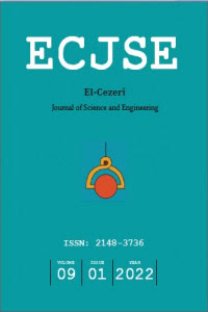Vişne Suyunun Antioksidan Aktivite Değerinin Yanıt Yüzey Metodu İle Modellenmesi Ve Genetik Algoritma Kullanılarak Optimizasyonu
Antioksidan Aktivite, Yanıt Yüzey Metodu, Genetik algoritma, Ultrasonikasyon, Vişne Suyu
___
- Leistner, L., & Gorris, L. (1995). Food preservation by hurdle technology. Trends Food Science Technology, (6), 41-46.
- Leighton, T. G. (2007). What is ultrasound? Progress in Biophysics and Molecular Biology, (93), 3-83.
- Chandrapala, J., Oliver, C., Kentish, S., & Ashokkumar, M. (2012). Ultrasonics in food processing - Food quality assurance and food safety. Trends in Food Science & Technology, (26), 88-98.
- McClement, D. J. (1995). Advances in the application of ultrasound in food analysis and processing. Trends in Food ,Science & Technology, 6, 293-299.
- Earnshaw, R. G., Appleyard, J., & Hurst, R. M. (1995). Understanding physical inactivation processes: combined preservation opportunities using heat, ultrasound and pressure. International Journal of Food Microbiology, 28, 197-219.
- Butz, P., & Tauscher, B. (2002). Emerging technologies: chemical aspects. Food Research International , 35, 279-284.
- Miller, N. J., & Rice-Evans, C. (1997). Factors influencing the antioxidant capacity determined by the ABTS' radical cation assay. Free Radical Biology and Medicine, (26), 195-199.
- Wang, H., Cao, G., & Prior, R. (1996). Total Antioxidant Capacity of Fruits. Journal of Agriculture and Food Chemistry, 44, 701-705.
- Gharras, H. (2009). Polyphenols: food sources, properties and applications - a review. International Journal of Food Science & Technology, (44), 2512-2518.
- Kim, D. O., Heo, H. J., Kim, Y. J., Yang, H. S., & Lee, C. Y. (2005). Sweet and Sour Cherry Phenolics and Their Protective Effects on Neuronal Cells. Journal of Agricultural Food Chemistry, 53, 9921-9927.
- Serafini, M., Bellocco, R., Wolk, A., & Ekström, A. (2002). Total Antioxidant Potential of Fruit and Vegetables and Risk of Gastric Cancer. Gastroenterology, 123, 985-991.
- Velioglu, Y. S., Mazza, G., Gao, L., & Oomah, B. D. (1998). Antioxidant Activity and Total Phenolics in Selected Fruits, Vegetables and Grain Products. Journal of Agriculture and Food Chemistry, (46), 4113-4117.
- Ataie-Jafari, A., Hosseini, S., Karimi, F., & Pajouhi, M. (2008). Effects of sour cherry juice on blood glucose and some cardiovascular risk factors improvements in diabetic women. Nutrition & Food Science, 38(4), 355-360.
- Koç, B. & Ertekin, F., K., (2009). Yanıt Yüzey Yöntemi Ve Gıda İşleme Uygulamaları, GIDA, 3(1), 1-8.
- Banga, J., R., Balsa-Canto, E., Moles, C., G., Alonso, A., A., (2003). Improving food processing using modern optimization methods. Trends Food Sci & Tech, 14: 131-144.
- Saguy, I., Mishkin, M., A., Karel, M., (1984). Optimizati¬on methods and available software, part1. CRC Critical RevFood Sci and Nutr, 20 (4): 275-299.
- Doganis, P., Alexandridis, A., Patrinos, P., Sarimveis, H., (2006). Time series sales forecasting for short shelf-life food products based on artificial neural networks and evolutionary computing. Journal of Food Engineering, 75: 196–20.
- Chen, M., Chen, K., Lin, C., (2005). Optimization on response surface models for the optimal manufacturing conditions of dairy tofu. Journal of Food Engineering, 68: 471–480.
- Morimoto, T., Purwanto, W., Suzuki, J., Hashimoto, Y., (1997). Optimization of heat treatment for fruit during storage using neural networks and genetic algorithms. Computers and Electronics in Agriculture, 19: 87–10.
- Myers RH, Montgomery DC. (1995). Response Surface Methodology, Process and Product Optimization Using Designed Experiments. 2nd ed. John Wiley and Sons, New York, NY.
- Myers, R., H., Montgomery, D., C., Vining, G., G., Borror, C., M., Kowalski, S., M., (2004). Response Surface Methodo¬logy: A Retrospective and Literature Survey, J Quality Tech, 36:53-77.
- Mazumder, P., Rudnick, E., M., (1999). Genetic Algorithms for VLSI Design Layout&Test Automation, Prentice Hall Inc.
- Goldberg, D., E., (1989). Genetic Algorithms in Search Optimization and Machine Learning, Addison-Wesley, Reading.
- Akyaz, Ö. GA ile Parametreleri Optimize Edilmiş Bulanık Mantık Denetleyici ile Kapalı Ortam Nem ve Sıcaklık Denetiminin Gerçeklenmesi Erişim tarihi: 10 Şubat 2016, http://www.3eelectrotech.com.tr
- ISSN: 2148-3736
- Yayın Aralığı: Yılda 3 Sayı
- Başlangıç: 2013
- Yayıncı: Tüm Bilim İnsanları ve Akademisyenler Derneği
Mikro Frezeleme Tezgahının Tasarımı ve Kısımları
Mustafa DÜNDAR, Ferit FIÇICI, Fatih ÖZEN
Veri Madenciliği İle Yazılım Hata Tespiti
Resim Şifreleme Amacıyla Dinamik S Kutusu Tasarımı İçin Bir Yöntem
İçten Yanmalı Motor Atık Isılarının Geri Kazanımında Termoelektrik Jeneratörlerin Kullanımı
Huffman Algoritmasıyla Kayıpsız Hızlı Metin Sıkıştırma
Sonar Algılayıcılar ve Sezgisel Yöntemler ile Otonom Robotlarda Engelden Sakınım ve Yol Bulma
Radyasyonun Lamotrijin ve Flurbiprofen Üzerine Etkisinin EPR Çalışması
Şemsettin OSMANOĞLU, Farhad Hamadameen HAMADAMEEN, Ali YEŞİL, Kerem SÜTÇÜ, Yunus Emre OSMANOĞLU
